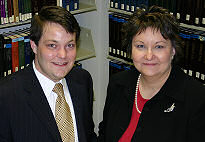College of Law Alum's Efforts Free Second Wrongly-convicted Man
December 12, 2007

Enlarge Cliff Williams ('07) and Aimee Maxwell ('87), Executive Director of the Georgia Innocence Project When Cliff Williams found out a piece of flesh had been destroyed nearly 30 years ago, it took the wind out of his sails.
But he knew there were hairs left over, somewhere, from the 1979 Meriwether County rape case. He just had to find them and have them examined.
Williams, who graduated in May from Georgia State University's College of Law, began working on John White's case as an intern with the Georgia Innocence Project in 2006.
White was convicted in 1980 of the brutal rape of an elderly woman. Williams said the evidence against him included a piece of human flesh apparently left by her attacker, and a number of African-American hair samples. White was convicted based on an analysis of the hair samples and a comparison method no longer in use.
Williams thought his best hope of finding DNA to exonerate White would lie in the piece of flesh, but he learned it had been destroyed just weeks after White's trial. So he turned his attention to the hairs, which were found in the possession of the Meriwether County court clerk.
A Georgia Bureau of Investigation forensic analysis found last week that White could not have been the woman's attacker, and he was freed Monday from Macon State Prison. Another man has since been arrested for the crime based on the DNA evidence gathered from the hairs.
“It's an absolutely incredible feeling to be able to give someone their life back,” says Williams, 28. “But it's also troubling because you realize that the criminal justice system is a human system and there is potential for error in that system.”
Williams, who was involved earlier this year in securing the release of Pete Williams, another man wrongly convicted of rape, is studying to take the bar exam in July. He's been splitting his time since graduating between volunteering with GIP and working for a private law firm on a federal criminal case.
After passing the bar, he plans to apply for a position at a defense firm in Atlanta or work in a public defender capacity.
“I cannot wait to start representing clients,” he said.
Though he started law school inclined to practice real estate or corporate law, he's found working with criminal defendants “is the most rewarding work in the world and it's something I want to do the rest of my life.”
Michael Davis, 404-413-1356
University Relations